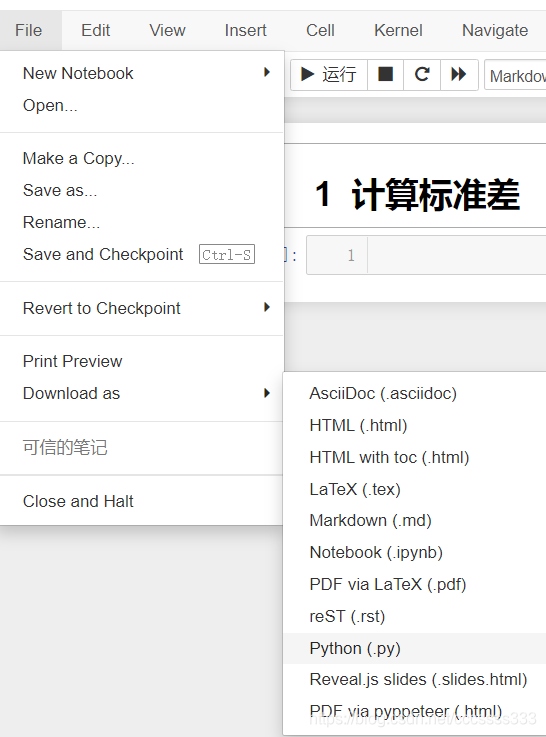在jupyter中导入.ipynb文件
直接引用问题
用jupyter时,保存的文件后缀是.ipynb。直接import是不能使用的。直接导入会报错为:没有该模块。

四种解决的方法
1.用%run命令,最简单,但被引用文件最好只有类和函数
2.用import_ipynb模块导入.ipynb文件,简单,但无法读取最新修改的被引用文件
3.加入另外语句,比较麻烦
4.将.ipynb文件转化为.py文件。但是在后期的使用时会造成一定的不便。因为习惯使用.ipynb进行编程,每次修改之后都必须重新进行文件的转化,特别是引用文件比较多时,对文件的管理以及后续的编程带来很大的不便。
被引用functionDataset.ipynb文件定义
假定现在有一个jupyter文件为functionDataset.ipynb。里面有内置函数printYes,定义和运行结果如下所示:
def printYes():
print("YES")

方法1.用%run命令
%run functionDataset.ipynb
printYes()
这个方法的好处就是,修改了被引用文件functionDataset.ipynb之后,保存,无需运行。
在引用它的文件里面再运行一次%run命令,就可以读取新的functionDataset.ipynb了。
方法2.用import_ipynb模块导入
// 用之前需要先下载该模块
import import_ipynb
from functionDataset import *
printYes()
即可运行,非常简单。但是无法读取修改后的文件。笔者能找到的方法只有退出jupyter再打开才能读取新的被引用文件。非常麻烦
方法3.加入另外语句
方法3-引用文件importFile.ipynb定义
现在在其他的jupyter文件中引用该.ipynb文件,定义为importFile.ipynb
// 导入相关模块
import io, os, sys, types
from IPython import get_ipython
from nbformat import read
from IPython.core.interactiveshell import InteractiveShell
def find_notebook(fullname, path=None):
"""find a notebook, given its fully qualified name and an optional path
This turns "foo.bar" into "foo/bar.ipynb"
and tries turning "Foo_Bar" into "Foo Bar" if Foo_Bar
does not exist.
"""
name = fullname.rsplit('.', 1)[-1]
if not path:
path = ['']
for d in path:
nb_path = os.path.join(d, name + ".ipynb")
if os.path.isfile(nb_path):
return nb_path
# let import Notebook_Name find "Notebook Name.ipynb"
nb_path = nb_path.replace("_", " ")
if os.path.isfile(nb_path):
return nb_path
class NotebookLoader(object):
"""Module Loader for Jupyter Notebooks"""
def __init__(self, path=None):
self.shell = InteractiveShell.instance()
self.path = path
def load_module(self, fullname):
"""import a notebook as a module"""
path = find_notebook(fullname, self.path)
print ("importing Jupyter notebook from %s" % path)
# load the notebook object
with io.open(path, 'r', encoding='utf-8') as f:
nb = read(f, 4)
# create the module and add it to sys.modules
# if name in sys.modules:
# return sys.modules[name]
mod = types.ModuleType(fullname)
mod.__file__ = path
mod.__loader__ = self
mod.__dict__['get_ipython'] = get_ipython
sys.modules[fullname] = mod
# extra work to ensure that magics that would affect the user_ns
# actually affect the notebook module's ns
save_user_ns = self.shell.user_ns
self.shell.user_ns = mod.__dict__
try:
for cell in nb.cells:
if cell.cell_type == 'code':
# transform the input to executable Python
code = self.shell.input_transformer_manager.transform_cell(cell.source)
# run the code in themodule
exec(code, mod.__dict__)
finally:
self.shell.user_ns = save_user_ns
return mod
class NotebookFinder(object):
"""Module finder that locates Jupyter Notebooks"""
def __init__(self):
self.loaders = {}
def find_module(self, fullname, path=None):
nb_path = find_notebook(fullname, path)
if not nb_path:
return
key = path
if path:
# lists aren't hashable
key = os.path.sep.join(path)
if key not in self.loaders:
self.loaders[key] = NotebookLoader(path)
return self.loaders[key]
sys.meta_path.append(NotebookFinder())
最后导入.ipynb文件即可,导入后就可以使用其内置函数,使用方法和.py的一样
from functionDataset import *
printYes()
显示运行结果为

即运行成功。
方法4.将被引用文件导出.py文件

在jupyter界面工具栏依次选择file-download as - python(.py)即可导出。
具体可以看参考的nbviewer的教程链接。








 本文介绍了在Jupyter环境中引用.ipynb文件的四种方法:1) 使用%run命令,适用于简单场景;2) 通过import_ipynb模块,但无法实时更新;3) 添加额外语句导入,过程较复杂;4) 将.ipynb转换为.py文件,方便后续编程,但修改后需频繁转换。每种方法的特点和适用场景都有所不同。
本文介绍了在Jupyter环境中引用.ipynb文件的四种方法:1) 使用%run命令,适用于简单场景;2) 通过import_ipynb模块,但无法实时更新;3) 添加额外语句导入,过程较复杂;4) 将.ipynb转换为.py文件,方便后续编程,但修改后需频繁转换。每种方法的特点和适用场景都有所不同。
















 1546
1546

 被折叠的 条评论
为什么被折叠?
被折叠的 条评论
为什么被折叠?








